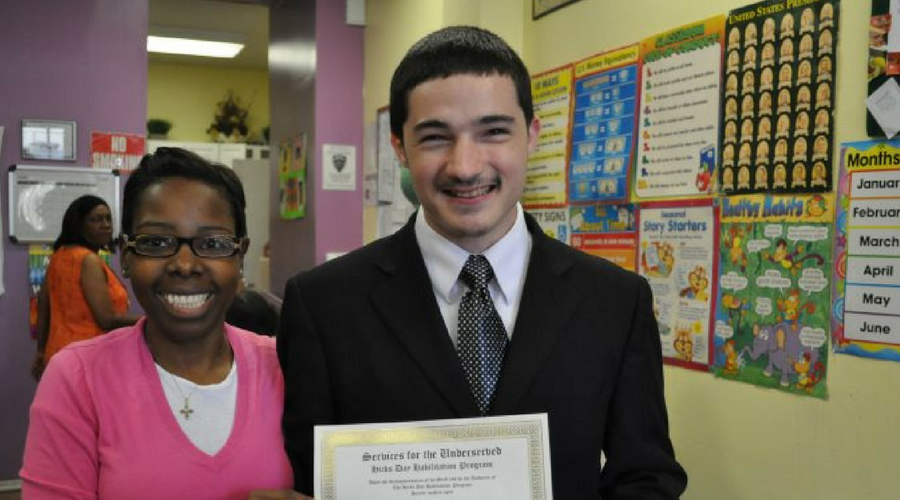The Real Impact of Misconceptions about Developmental Disabilities

Photo credit: S:US
March 30, 2018
By Louis Cavaliere
As the world reflects on the death of renowned astrophysicist Stephen Hawking, who had a physical disability and used a wheelchair, disability rights advocates have pointed out the problematic ways some people have reacted to his death – saying that he ‘overcame his disability’ or even suggesting that death freed him from his disability. What is the problem with these comments? While they may seem well-meaning, they center solely on Hawking’s disability, not his humanity or the incredible accomplishments he achieved while living with his disability.
These labels echo those we often hear about people with intellectual/developmental disabilities (I/DD). While the Centers for Disease Control and Prevention estimate that about one in six children in the US has one or more developmental disabilities, mainstream understanding of I/DD remains very simplistic: people with I/DD are seen as inspirational, brave, simple, and innocent, while at the same time they are labeled as a burden, unemployable, unable to be independent, and worthy of isolation away from their communities.
Whether it’s Stephen Hawking or anyone else with a disability, they are seen as only disabled instead of being seen as people with innate value and complex, individual personalities. This ignores their full humanity and personhood. When we don’t recognize a person’s full humanity, we downplay their value. When people are reduced to a label – and therefore confined to the margins – their voices are silenced. When we aren’t listening to their voices, misconceptions thrive.
From misleading links between autism and violence, to ignored allegations of abuse, people with disabilities are particularly vulnerable to stigma and stereotypes. Their lives are also strongly impacted by public policy, and this can have immense real-life impacts on the opportunities they are afforded in life.
Just look at where we’ve been. A few short decades ago, people with intellectual/developmental disabilities were even more marginalized, confined to large institutions and excluded from mainstream schools, jobs, and residences. The movement to close these large institutions, called “deinstitutionalization,” moved a huge percentage of Americans with disabilities into community-based environments with services built within, not apart from, their communities.
The results of these programs shatter stereotypes about people with I/DD. From decades of providing community-based support at Services for the UnderServed (S:US), we see every day that disabilities do not prevent people from building full lives and doing things that common stigmas would have us think are impossible – working, learning employable skills, living independently, falling in love, building families, maintaining friendships, and contributing to society.
Even with the success of community-based services, we must still push for more inclusion and recognize the ways that people with disabilities are still marginalized. March is Developmental Disabilities Awareness Month. This year’s theme of #SeeMeForMe challenges us to center the stories of people with disabilities within their own perspective, to move away from the urge to speak for people who are capable of speaking for themselves. True inclusion is about uplifting voices and centering one’s humanity.
Programs encouraging self-advocacy are a step in this direction. Self-advocacy, or self-determination, empowers individuals with I/DD to decide for themselves what support they need and the path they want for their own lives. Self-advocates are encouraged by a circle of support—friends, family, peers, and colleagues – who help advocate for them and help them achieve their goals. As a continuation of this work, S:US is participating in a pilot facilitation project with Supported Decision-Making New York, which promotes decision-making for people with I/DD as an alternative to guardianship. This is based on the idea that we all, regardless of ability, make decisions with the support of other people and resources.
Mary, who lives at an S:US residence for people with I/DD and is the president of S:US’ self-advocacy group, shares her perspective: “Self-advocacy means that, if you have any problems or anything you need to work on, you advocate for yourself and say ‘I want this or I want that. I want this to happen to me, I want that to happen to me.’ Stuff like that.”
“Not all disabled people can’t do things for themselves. I’m disabled myself and I can do a lot for myself. Just because you’re disabled doesn’t mean you can’t write or you can’t read. I don’t know why some of these people on this earth, especially kids, make fun of people that have disabilities. It’s not right and it’s not fair. You don’t know if your kids will grow up and be the same way that we are.”
Lous Cavaliere, S:US Executive Vice President for Developmental Disabilities Services, has dedicated his entire professional life to providing services and advocating for people with disabilities. He began his career in the disabilities field as a paraprofessional working with adolescents with autism, and joined S:US in 1987 as the Psychologist at S:US’ Valentine intermediate care facilities for individuals with intellectual/developmental disabilities. He holds a BA in Psychology and MS degree in School Psychology from St. John’s University.
